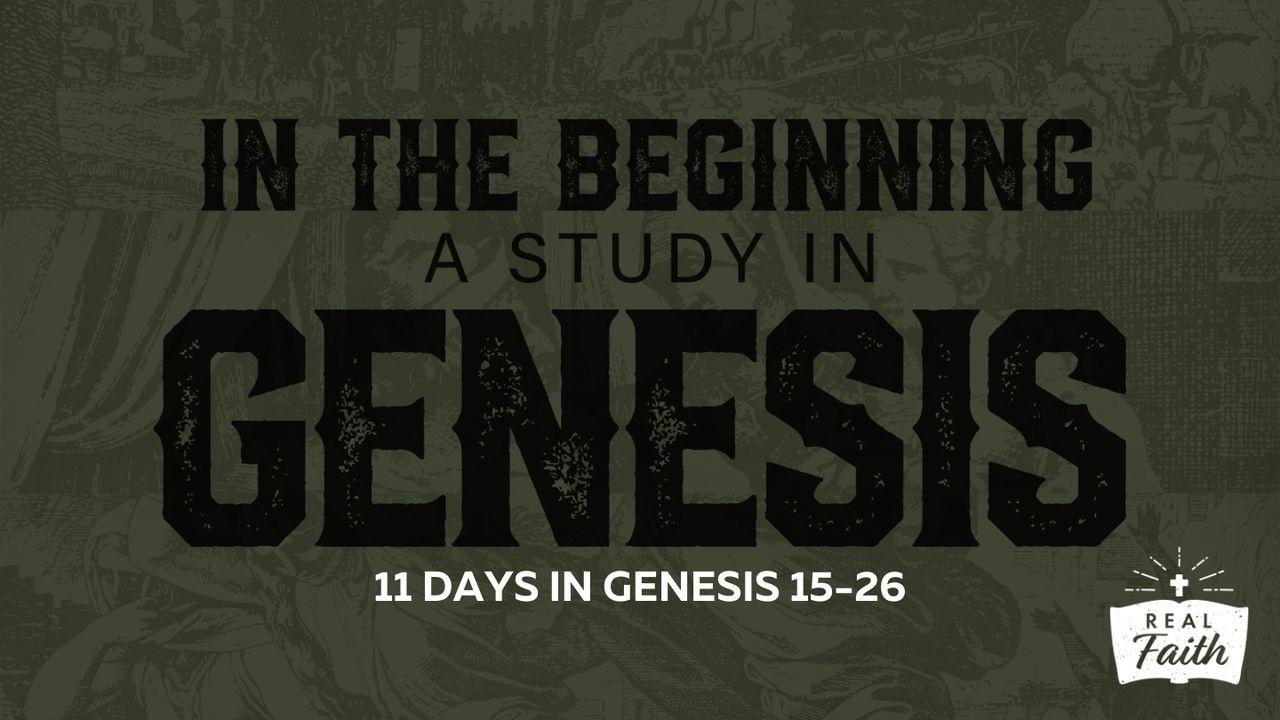In the Beginning: A Study in Genesis 15-26نموونە

Does God Choose Some People but Not Others?
The book of Genesis has been building in anticipation since chapter 12 for the birth of Abraham’s promised son, Isaac. In Genesis 21, that hope is realized some 25 long and arduous years later. Abraham’s son was born just when and how God promised, and Abraham circumcised his son at eight days of age just as the Lord had commanded. This reminds fathers that we do not just sire sons, but rather are commanded by our Father to father them in covenant relationship with the Lord.
Sarah responded with expectedly great joy as the elderly barren woman was finally holding her baby boy by a miracle of God. Previously, she laughed in mockery of God, and now she laughs in worship of God. Her latter joyful response is much like her descendant, Mary, years later at the birth of the promised Son of God, Jesus Christ.
Abraham and Sarah (now 100 and 90 years old, respectively) named the boy Isaac, meaning laughter, just as God has told them. Sarah had previously laughed when God said they would be parents. On this occasion, she laughed in joyous worship for the grace of God that brought her a son, which was quite unlike her previous laughter of unbelief that basically mocked the promises of God.
As Isaac grew, tensions again escalated between Sarah and Hagar who had born Abraham’s first son, Ishmael. In this, we see the pains of polygamy, which is a theme throughout Scripture.
God told us in Genesis 1-2 that marriage was for only one man and one woman by divine design. When Isaac was about three years of age, Ishmael, who was in his late teens, curiously mocked and laughed at Isaac. This theme of brotherly conflict is throughout Genesis and includes Cain and Abel as well as Ham, Shem, and Japheth.
The mockery of her young son infuriated Sarah, though it was in fact the same kind of laughter she had previously directed at God. Everyone in the storyline of Genesis loves the boy Ishmael (the Lord, the angel, Hagar, Abraham) except Sarah, who despised him. Nonetheless, God permitted Sarah to send Hagar and Ishmael away and promised Abraham that, though Ishmael was not part of the covenant line that would bring forth Jesus Christ, he would be cared for and protected. In this way, God may not have been so much discarding Ishmael and Hagar as removing them from an increasingly tense and unpleasant family situation with Sarah.
Abraham sent Hagar and Ishmael out into the desert with only some food and a few gallons of water, which is probably all they could carry. While his actions appear to be thoughtless and cruel (which they may have been), it is also possible that Abraham simply believed God’s promise to take care of the boy and bless him as he already had blessed Abraham and those associated with him, such as Lot. The Scriptures simply do not say whether Abraham acted in trust or terror.
Out of water and wandering in the desert with her son, Hagar sat in despair, anticipating that she and her son would die of thirst as the boy wept. In a repeat of events prior in Genesis 16, “the angel of the Lord” (who is probably the pre-incarnate Jesus in what is called a Christophany appearance) spoke to her. From Heaven, He promised to care for her and her son and make them into a great nation and then provided a well for them to drink from. God remained true to his promise regarding Ishmael, and the boy grew up in the desert as a skilled archer. His marriage to an Egyptian woman is likely an indicator that he did not worship God but lived by his own courage and strength, much like his Arab descendants to this day who do not worship Jesus Christ but look to Ishmael as their father. Curiously, this region in Saudi Arabia is the birthplace of Mohammed, who is a descendant of Ishmael and father of all Arabs. It is near the Muslim holy site of Mecca where the pre-incarnate Jesus Christ visited Ishmael and Hagar. The site of this well is also a Muslim holy site called the spring of Zamzan.
Having now calmed the tensions in the storyline of Abraham’s families with their conflicts resolved, the master storyteller Moses has reserved the climactic test of Abraham’s faith for the near sacrifice of Isaac in Genesis 22.
Questions:
- Looking at everyone in the story – who do you most identify with and why (Abraham, Sarah, Isaac, Hagar, Ishmael)?
- What do you learn about God from this story, particularly His kindness to everyone involved?
کتێبی پیرۆز
دەربارەی ئەم پلانە

In this 11-day plan, you will study Genesis 15-26, focusing on God’s faithfulness to sinful families that He works through for His glory. It includes a devotional passage for each day as well as reflection questions to apply this book of the Bible to your life. Whether you’re just curious about the Bible, a new believer, or a long-time follower of Jesus, God will speak to you through it.
More









